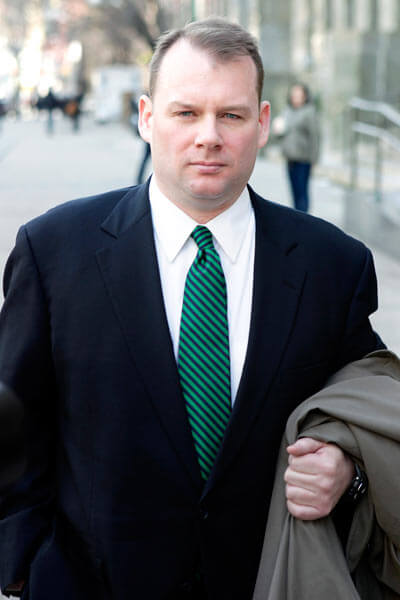By Howard Koplowitz
An attorney for Queens political operative and Bloomberg campaign volunteer John Haggerty, who is on trial in Manhattan Supreme Court for allegedly stealing $1.1 million of the mayor’s money, told jurors during closing arguments Tuesday that the Manhattan district attorney’s office came to a “rush of judgment” in charging the Forest Hills resident while prosecutors claimed key e-mails will seal Haggerty’s guilt.
Haggerty is accused of using the $1.1 million, which was earmarked by the Bloomberg campaign in 2009 for a poll-watching operation to be conducted through Haggerty and funded by a donation the mayor gave to the state Independence Party, and using it to buy out his brother’s share of their late father’s Forest Hills Gardens home.
The defense has claimed that since the donation constitutes a gift, Bloomberg had no control over the money’s use while the DA’s office contended Haggerty was trusted to hire poll watchers but instead created phony invoices and checks and used the money to purchase the home.
“The district attorney’s office has had a rush to judgment about what happened in this case,” said Haggerty attorney Dennis Vacco, claiming prosecutors never presented evidence that Haggerty falsified business records, which he said was “a stark example of the district attorney’s desire to rush to judgment in this case.”
Manhattan Supreme Court Judge Ronald Zweibel, who indicated he would give jurors their instructions on Wednesday morning and then deliberations will start, threw out the falsifying business records charge.
Haggerty faces grand larceny and money laundering charges, which could put him in jail for up to 25 years if found guilty.
Vacco criticized prosecution witnesses, including Bloomberg, who testified he could not recall ever speaking to Haggerty, and Bloomberg campaign election attorney Ken Gross for not remembering details that were important to the case.
“It struck me that the witness the prosecution probed the longest was a guy who didn’t know anything,” Vacco said, referring to Gross’ testimony that he could not remember e-mails about Haggerty’s budget for the ballot security operation, which included hiring 1,355 poll watchers at $350 apiece.
“There were so many, ‘I can’t recalls,’ ‘I don’t remembers,’ ‘I don’t knows,’ that we can fill up a Webster’s Dictionary with those three phrases,” Vacco said.
Vacco said Bloomberg’s testimony “was just simply a lie” and “disingenuous” because Haggerty was one of the few key advisers who were monitoring election returns with the mayor.
He also questioned why many prosecution witnesses had attorneys.
“What were they hiding? Why did they all need to lawyer up, including the mayor?” Vacco asked.
In speaking to the jury, Assistant District Attorney Eric Seidel pointed to a series of e-mails that he said proves Haggerty deliberately misled the Bloomberg campaign about the ballot security operation, including messages where Haggerty demanded the Independence Party pay him for services he failed to deliver.
“E-mails are the best evidence,” Seidel said. “The e-mails are almost like a GPS that ponits to the defendant’s guilt.”
Seidel said Haggerty had only $176.50 in his bank account before he received the funds from the Independence Party.
“He did not have the money to buy the house,” Seidel said,
He told the jury that $50,000 was wired from the party to Haggerty’s personal bank account and in turn Haggerty wired $50,000 that day to his brother, Bart Haggerty, who was part owner of their father’s estate until John Haggerty bought him out.
“We know the ultimate source of that money is from Mayor Bloomberg,” Seidel said. “We know that from the bank records.”
Seidel said Haggerty set up a company called Special Election Operations, which was created in December 2009 and based in Albany, that did not have a phone number or mailbox but had a bank account and was used by Haggerty to transfer funds from his personal account.
“Not one cent went from SEO to ballot security,” he said, referring to Special Election Operations.
Seidel claimed only about $33,000 was spent on ballot security, including $18,000 on car rentals and $5,000 for Nextel two-way radios.
Reach reporter Howard Koplowitz by e-mail at hkoplowitz@cnglocal.com or by phone at 718-260-4573.
































